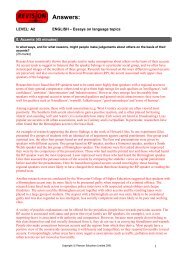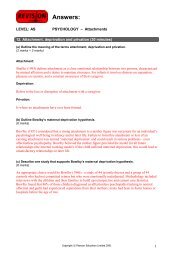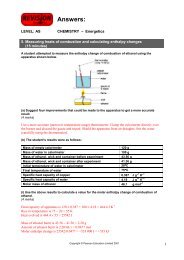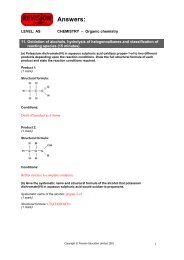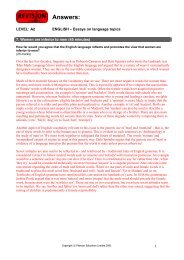The Dove Campaign for Real Beauty - Pearson
The Dove Campaign for Real Beauty - Pearson
The Dove Campaign for Real Beauty - Pearson
You also want an ePaper? Increase the reach of your titles
YUMPU automatically turns print PDFs into web optimized ePapers that Google loves.
www.pearson.co.uk/kotlerPart 1 Marketing now●●●<strong>The</strong> study of 5,000 consumers found international differences:Germans felt that ‘business ethics had worsened’.<strong>The</strong> more optimistic British thought that supporting ethical brands could help makecompanies more accountable but were wary that ethical brands were <strong>for</strong> ‘people with money’.French were more likely than US respondents to prioritise environmental issues.● Spaniards were enthusiastic about ethical food and beauty, but scoffed hype. 37“Consumers are confused. <strong>The</strong> public is not sure what an ethical brand actually is.Having discussed citizen and public actions to regulate marketing, we will next examine thebusiness actions towards socially responsible marketing that lead to different philosophies ofenlightened marketing and the fostering of marketing ethics.“KEY CONCEPTBusiness actions towards sociallyresponsible marketingEnlightened marketing—A marketing philosophyholding that a company’smarketing should supportthe best long-run per<strong>for</strong>manceof the marketingsystem; its five principlesare consumer-orientedmarketing, innovativemarketing, valuemarketing, sense-ofmissionmarketing andsocietal marketing.Consumer-orientedmarketing—<strong>The</strong> philosophyof enlightenedmarketing that holds thatthe company should viewand organise itsmarketing activities fromthe consumers’ point ofview.At first, many companies opposed consumerism and environmentalism. <strong>The</strong>y thought the criticismswere either unfair or unimportant. But, by now, most companies have grown to embracethe new consumer rights, at least in principle. <strong>The</strong>y might oppose certain pieces of legislationas inappropriate ways to solve specific consumer problems, but they recognise the consumer’sright to in<strong>for</strong>mation and protection. Many of these companies have responded positively toconsumerism and environmentalism in order to create greater customer value and to strengthencustomer relationships.Enlightened marketing<strong>The</strong> philosophy of enlightened marketing holds that a company’s marketing should support thebest long-run per<strong>for</strong>mance of the marketing system. Enlightened marketing consists of fiveprinciples: consumer-oriented marketing, customer-value marketing, innovative marketing,sense-of-mission marketing and societal marketing.Consumer-oriented marketingConsumer-oriented marketing means that the company views and organises its marketing activitiesfrom the consumer’s point of view. It works hard to sense, serve and satisfy the needs of adefined group of customers. Good marketing companies tend to have one thing in common – anall-consuming passion <strong>for</strong> delivering superior value to carefully chosen customers. Only by seeing theworld through its customers’ eyes can the company build lasting and profitable customer relationships.Value marketingAccording to the principle of customer-value marketing, the company should put most of itsresources into value-building marketing investments. Many things marketers do – one-shot salespromotions, minor packaging changes, direct-response advertising – may raise sales in the shortrun, but add less value than would actual improvements in the product’s quality, features or96



